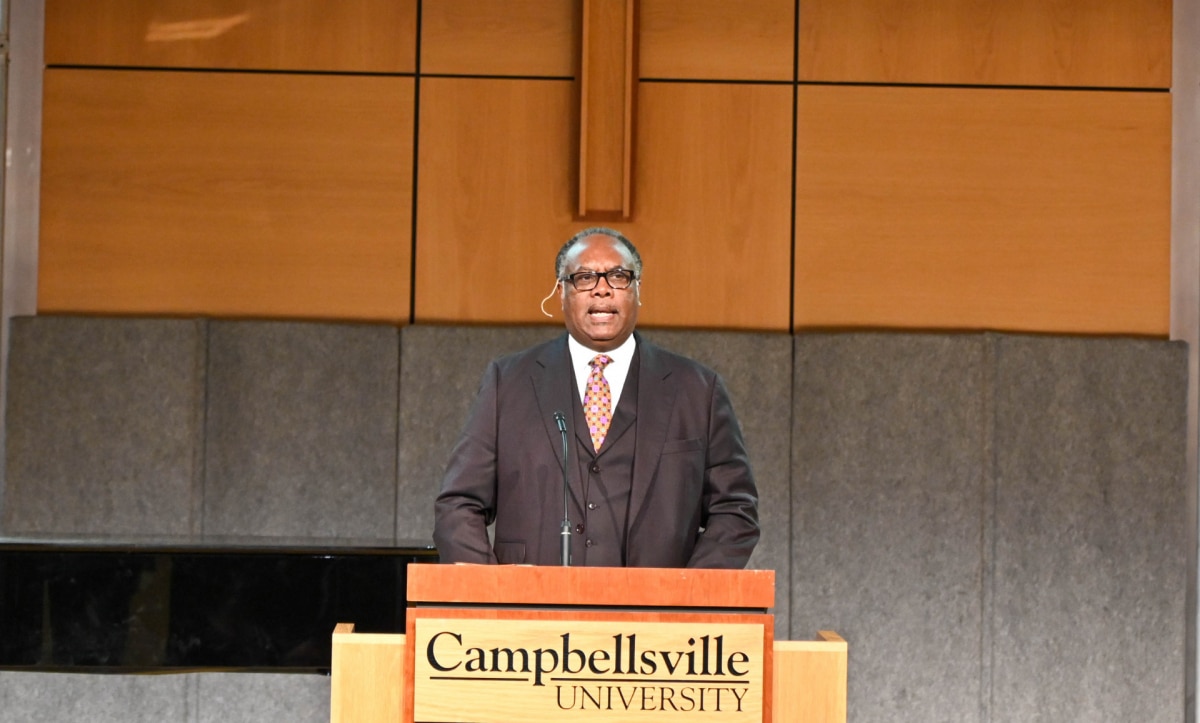
By Gerard Flanagan, news writer and photographer, Office of University Communications
CAMPBELLSVILLE, Ky. –Within 18 months, Dr. Samuel Tolbert and his congregation at Greater St. Mary Missionary Baptist Church in Lake Charles, La. had endured a hurricane, an ice storm, and a flood, in addition to the fallout of the COVID-19 pandemic.
Tolbert spent 13 months displaced from his home, all while trying to build a new church building and lead his congregation through the myriad of challenges.
“That in itself created a lot of pressure as to how we did ministry in the aftermath of these calamities,” Tolbert said during Campbellsville University’s Dialogue on Race chapel on Oct. 12 in Ransdell Chapel. “The pressures of ministry were multiplied. Ministry is not absent of anxiety and pressure.”
Dialogue on Race started at Campbellsville University in 1999 and has involved many guest speakers as well as meetings to discuss racial injustice and concerns.
Tolbert, who was elected as president of the National Baptist Convention of America International in 2014, read from 2 Timothy 2:3-6: “Join with me in suffering, like a good soldier of Christ Jesus. No one serving as a soldier gets entangled in civilian affairs, but rather tries to please his commanding officer.
“Similarly, anyone who competes as an athlete does not receive the victor’s crown except by competing according to the rules. The hardworking farmer should be the first to receive a share of the crops.”
Tolbert used the apostle Paul’s words to Timothy as a framework for handling pressure. First, Tolbert said we should handle pressure like a soldier. Some of the traits a good soldier has include physical fitness, endurance, fast reaction time, and being an active listener, Tolbert said.
“A soldier must give all their energies to warfare,” Tolbert said. “They must give none of their energies to worldly affairs. Those of us who are Christians will be required to suffer as a soldier.”
Paul uses soldier-like language in 2 Corinthians 10:3-5: “For though we walk in the flesh, we do not war according to the flesh. For the weapons of our warfare are not carnal but mighty in God for pulling down strongholds, casting down arguments and every high thing that exalts itself against the knowledge of God, bringing every thought into captivity to the obedience of Christ.”
“We must prepare ourselves against the opponents of the Gospel,” Tolbert said. “Young Timothy has been enlisted to serve as a soldier, and this prepares him for the pressure and struggles that are ahead.
Tolbert said a good soldier cannot be separated from discipline.
“Discipline is part of a soldier’s life,” he said. “The soldier does not become entangled in things that would be a hindrance to his single-minded dedication to follow gladly Christ Jesus.”
Tolbert said Christians should view themselves as soldiers on active duty.
“We need to understand we are not in the reserves or been discharged,” Tolbert said. “We’re not a soldier on leave, and Satan knows that. We’re soldiers on active duty. At any moment, we could be called upon to act for the cause of Christ.”
Referring back to 2 Timothy 2:3-6, Tolbert said we should handle pressure like an athlete.
“Athletes are normally endowed with extraordinary self-confidence,” Tolbert said.
Tolbert told the audience he ran track in high school, and he said he discovered he didn’t have the self-confidence to be an athlete.
“I was running a race, and someone got in front of me, and I ran off to the sidelines,” Tolbert said. “We cannot do that in the army of the Lord, but we must have the self-confidence to continue in this work. It takes more than a desire for a shiny medal.
“There must be an innate desire to succeed for Jesus.”
Athletes also possess self-discipline and a desire to achieve.
“The winner is crowned, and Paul refers to a reef that is perishable,” Tolbert said. “Yet, we understand the prize here is an imperishable crown, and this crown points to the crown of righteousness. For Christians, the point is that God crowns us to win and endure hardships.”
Referring back to 2 Timothy 2:3-6 once again, Tolbert said we should also handle pressure like a farmer.
“A farmer completes many of the same tasks each day,” he said. “I’ve talked to rice farmers in Louisiana, and no day is exactly like the day before. Every day, they meet new challenges. In this life, we need to know every day is not going to be the same.”
Paul said in 2 Timothy 2:3-6 the farmer should be the first to receive a share of his crops.
“That’s motivation to plant,” Tolbert said. “You know the day is coming when you are going to receive your share of the crop. What is yours is yours, and no one else can have it. Hard work means toil. It means to strive and struggle. You want to stop and give up, but you can’t.”
While living in one of eight locations during his 13 months of displacement, Tolbert would make an hour and forty-five minute drive every day.
“Sometimes, going back, I wanted to stop, but I knew members of the church were depending on their pastor,” he said. “I had a wife and two daughters who were depending on me to get the job done, get the house rebuilt and get the church back together.”
Tolbert closed by saying, “In the end, with these three illustrations, there are good outcomes.”
Campbellsville University is a widely acclaimed Kentucky-based Christian university with an enrollment of nearly 12,000 students. The university offers over 100 programs of study including doctoral, masters, bachelors, associate and certification programs. The website for complete information is www.campbellsville.edu.
